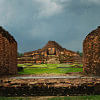Sacred heritage comes before public convenience

In a shocking move, municipal authorities in Patuakhali have begun constructing a public toilet on lands adjoining a 240-year-old ancient Buddhist temple of an indigenous community. The authorities claim that the land belongs to the government, but guardians of the Srimangal Buddha Bihar, which has been there for over two centuries, say the land is theirs and that they have the legal documents to prove it. There is an ongoing case between the Kuakata temple authorities and the Bangladesh Water Development Board regarding ownership of the land. Yet, the municipality has gone ahead with the project, ignoring repeated protests of the local Rakhine community as well as a court injunction in 2021 barring the construction of any structure on the contested land.
There is an ongoing case between the Kuakata temple authorities and the Bangladesh Water Development Board regarding ownership of the land. Yet, the municipality has gone ahead with the project, ignoring repeated protests of the local Rakhine community as well as a court injunction in 2021 barring the construction of any structure on the contested land.
We are at a loss to understand the municipal authorities' logic behind such an insensitive move. Even if the land had belonged to the government, there would still be no justification for constructing a public toilet on land that is considered sacred by the local community, and where many of their ancient idols are buried. Would the authorities have done the same if there were, for example, a 200-year-old mosque in its stead?
The authorities have not only disrespected local Buddhist believers but also wilfully violated a court injunction, which is equally alarming. Reportedly, the municipal authorities stopped their construction work on February 24 when the monastery displayed a copy of the order. However, at the dead of night, they resumed it, demolishing a monastery wall and completing the roof of the toilet. This is simply unacceptable.
In a recent statement, 44 eminent citizens of the country, echoing the fears of the indigenous community, stated that the construction was a ploy to evict them from their land. Any such attempts by the local administration must be investigated and stopped at any cost. Meanwhile, we demand an immediate halt to such ill-conceived construction works and urge the court to take action against those responsible for a direct violation of its orders.

 For all latest news, follow The Daily Star's Google News channel.
For all latest news, follow The Daily Star's Google News channel. 








Comments